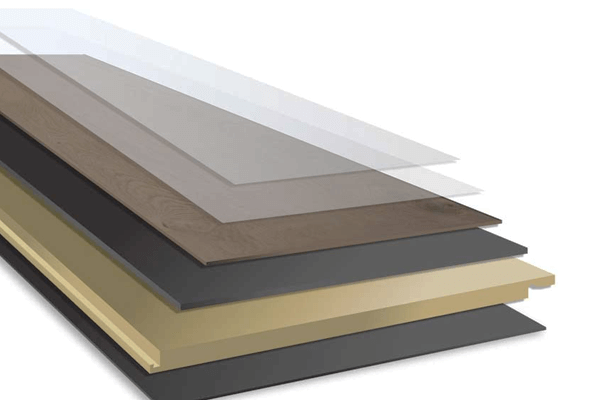Planning on installing new flooring for your home? Thinking of vinyl as an option? You’re correct in doing so. Vinyl can be a great material for your flooring because it is cheap, classy, and super easy to maintain. On top of that, you can also install vinyl floorings yourself with ease. That’s awesome!
But wait! Before you leap to opt for vinyl flooring, you must want to know what vinyl flooring is made of, right?
Well, this is why we brought you this article which has the well-researched answer to the question and lots of other important info that you may need to know about vinyl floorings. So, let’s get started!!!

What You’ve Been Missing
Top Rated Vacuums for Vinyl Plank Floor
Top Rated Mops for Vinyl Plank Floor
Waterproof Flooring for Pets
Contents
The Materials That Vinyl Flooring Is Made of
Simply put, vinyl flooring is simply a flooring that is made of Polyvinyl Chloride or PVC. This material is flexible and does not get damaged so easily. That’s super durable!
Most of the time, the industries use fiberglass in order to create vinyl floorings. For decoration and protection, an extra layer of plasticizer is printed on the fiberglass layer.
Vinyl tiles can sometimes be made to look like ceramic or terracotta tiles. On the other hand, there are some vinyl tiles that are given appearances like stone, marble, or wood, etc.
Now Let’s Get To Know The Steps Of How It’s Made:
1st step- The Basic Element of Vinyl
PVC is such a convenient compound that it can be tailored into making various types of useful materials.
In the first step of manufacturing vinyl floors, PVC is manufactured as a mixture of vinyl with some other vital chemical liquids.
This liquid material is shaped as a sheet that is as thin as a few millimeters. This is accomplished by the rolling process. Now, the liquid sheet is solidified by using heat and airflow.
At this point, the solid vinyl sheets are cut into various sizes such as 6,9, and 12 inches so they can be used as tiles. The basic vinyl tiles are made of PVC only.
But there is another type of vinyl tile that is made of VCT (Vinyl Composite Tile). In the composite variant of Vinyl, PVC is mixed with other ingredients such as synthetic fillers or binders.
2nd step- Forming Sandwich Construction
Solid vinyl plastic can mold into vinyl tiles that have very good wear resistance capacity. But if you only use solid vinyl tiles, you have limited options to create sophisticated or fancy flooring.
This is why manufacturers use sandwich construction to make a mixture of solid PVC and VCT to prepare a composite type of vinyl tiles. This has both the characteristics of a solid tile and also the fancy appearance of a composite tile.
Using fancy and intricate VCT type material in the middle as core material, industries add a solid or transparent PVC material layer on top and bottom of the core layer. As a result, we get a 3 layered sandwich construction of solid PVC and composite VCT.
Benefits Of Using Vinyl flooring
Let’s have a look at some of the perks of PVC:
- Low cost: The main benefit of vinyl floors that people are attracted to is their low cost of manufacturing. For this reason, vinyl tiles are very cheap in the market relative to other types of tile materials.
Thus, whenever someone has to change the flooring of their room, people consider vinyl flooring as a prime option.
- Ultra Durability: High-quality vinyl flooring can last for several decades. That’s unbelievable, right? As PVC does not degrade over time, vinyl is one of the most ultra-durable materials for flooring.
- Ease Of Installation: Vinyl tiles are manufactured in such a way that you can install them in your home yourself.
Although, we do recommend seeking a professional’s help if you are doing it for the very first time.
- Maintenance-friendly: Maintaining a floor made of vinyl is super easy. It resists dirt and water. Plus, there are dedicated vinyl cleaners available out there on the market to clean up dirt and stains from vinyl floors.
- Stunning Appearance: No matter what benefits we cite about vinyl floors, the truth remains that vinyl floorings are loved by everyone because of their stunning and gorgeous appearance.
A major positive point is that vinyl tiles can be manufactured with appearance like wooden or ceramic tiles. They can even be manufactured to look like glass or marble tiles.
- Ultra Water-resistant: Water-resistance comes as an added bonus with vinyl floors. In places with high moisture such as bathrooms or kitchens, vinyl can be your go-to option to install as a flooring material.
Are There Any Bad Effects Of Using Vinyl Tiles?
Well, though you can buy vinyl tiles at a very low cost, it is a matter of sorrow that a lot of toxic chemicals are used in the process of manufacturing PVC or Vinyl tiles. This creates a huge potential for environmental damage. That’s pathetic!
Dangerous chemicals like phenols are used to produce Vinyl tiles. If somehow these chemicals can find a way to the interior of a human body, they are sure to cause very hazardous diseases such as cancers, etc.
Many studies show that there is a subtle relation between skin irritation and respiratory disorder with having a vinyl floor in the home.
On top of that, if an incident of large fire happens in your home, the vinyl tiles will catch flames very quickly and burn within seconds and cause a larger accident.
Finally, as there is very little recycling possibility for vinyl tiles, it is recommended that they are used with the utmost care for as long as a user can.
Potential Alternative To Vinyl Flooring: Replacements Of PVC
If you are an environment-friendly person and looking for alternatives for vinyl floorings, you have linoleum as an option. Linoleum is naturally produced and is a bit more costly than vinyl flooring.
This material will require a higher level of maintenance than vinyl floorings ever will. But even so, it is a viable option since it’s recyclable.
Final Verdict
Well, that’s all there’s to it, people. Now that you’ve got a clear understanding on the materials that vinyl flooring is made of.
To sum it all up, whether you are considering installing new flooring or not, vinyl tile is a worthy candidate as a flooring material. If used with proper maintenance and disposed of properly after its life cycle is finished, vinyl can be a healthy choice for all of us.
As a budget-friendly option, we brought vinyl-related info to you. So, now you can make an informed choice when you are thinking about installing new flooring for your home.
Have a nice day, thanks!!!
